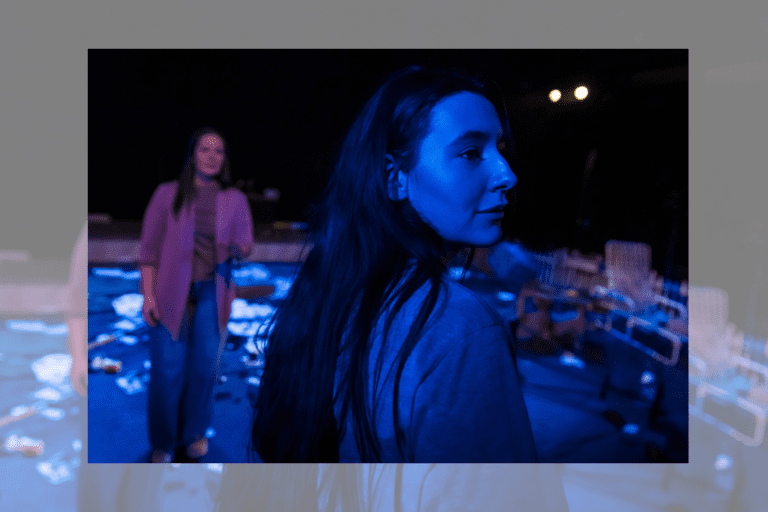REVIEW: The Sound of Music is enchanting at London’s Grand Theatre
The Grand Theatre’s production of The Sound of Music is a testament to why the musical is so enchanting. Even after an umpteenth viewing of Richard Rodgers and Oscar Hammerstein’s classic, the material still feels fresh.
In her director’s programme note, Rachel Peake thoughtfully explains why the heart of the iconic musical still speaks to a 21st-century audience. The Sound of Music is the story of people who are adrift and searching for a place where their hearts feel safe and at peace. To find that place, one must continue to “climb every mountain and search high and low.”
Young postulant Maria Rainer (Dominique Leblanc) stands out among the other sisters at Nonnberg Abbey. She climbs trees, waltzes on her way to Mass, sings when she shouldn’t, and even wears curlers under her wimple. To help calm the sisters’ frayed nerves and give Maria a taste of life outside the abbey walls, Mother Abbess (Janelle Cooper) sends Maria to be a governess for Captain Georg von Trapp (Adam Stevenson) and his seven spirited, unruly children, played with delightful precociousness. The children have been double-cast; I saw the Warm Woolen Mittens ensemble.
Maria quickly endears herself to the children, using music to reach their hearts and eventually their father, who, before Maria’s arrival, banned singing in the house since his wife’s passing. Eventually, Maria falls in love with the captain, prompting jealousy from his status-seeking fiancée Elsa (wonderfully played by Heather McGuigan), who realizes that Georg harbours mutual romantic feelings for Maria.
Lorenzo Savoini’s design of the von Trapp entranceway is majestic, the grand staircase showcasing the luxury of the family’s lifestyle. Savoini creates a fluid set design with quickly moving pieces and no noticeable squeaks from wheels. The appearance of Nazi swastikas in the second act elicited gasps from the audience on the night I attended. Savoini’s lighting design beautifully illuminates the entire Spriet stage, especially during the dinner scene at the end of the first act. Jessica Oostergo’s costumes, from the nuns’ habits to the period suits worn by the men, are remarkable replicas of 1930s style.
Peake elicits grounded performances from her actors. Stevenson doesn’t lose his composure when it becomes apparent members of his house staff have adopted Nazi ideology. His face and eyes convey his growing ire and disgust, but he never lashes out at others. Music director Alexandra Kane has encouraged vocal performances that soar to the theatre’s roof, enhanced by Emily Porter’s balanced sound design. Two songs brought tears to my eyes: Cooper’s standing ovation-worthy Act One conclusion, “Climb Ev’ry Mountain,” and Stevenson’s rendition of “Edelweiss.” His portrayal of a desperate and weary man and Leblanc’s genuine response to her husband’s emotions remain heartfully authentic.
Leblanc delivers a spirited and lively portrayal of Maria. During her confrontation with Captain von Trapp, she effectively addresses his lack of attention to the children, who desperately need their father’s affection.
One choice made feels a touch unconvincing from a Roman Catholic perspective. Although the stage directions indicate that Maria is to thank the Mother Abbess during the wedding scene in Act Two, I’m not entirely sure a hug makes sense. The strict Catholic religious context at that time would have deemed such a gesture inappropriate. Instead, one would typically bow the head, kneel, and kiss the ring or the hand of the Mother Abbess out of respect for her authority.
Stevenson portrays Captain von Trapp as steely and brooding, but he evolves into a loving and caring husband and father. Éamon Stocks, as bicycle messenger Rolf, brings a boyish charm and graceful movements to his role. Crystal Casera’s Liesl begins as a feisty young rebel but ultimately becomes an advocate for accepting Maria as a strong female role model. The cast of children works well together.
There are several strong supporting performances. Andrew Hodwitz’s Max is calculating, often weighing both sides of a situation to determine how to benefit financially, personally, or emotionally. Donna Garner’s Frau Schmidt is a practical housekeeper who communicates genuine care for Captain von Trapp and his family. And Curtis Sullivan’s initial charm as the blustery butler Franz is intriguing to observe as he evolves and reveals his true nature over time.
Peake emphasizes that The Sound of Music challenges us to consider how much we are willing to sacrifice to stand up for what we believe is right, especially when confronted with tyranny. Given Trump’s recent pronouncements directed at Canada, this question is particularly relevant for Canadians.
Good theatre wants us to question and think. The Sound of Music is good theatre, and a wonderful gift to give yourself this holiday season.
The Sound of Music runs at the Grand Theatre until December 29. Tickets are available here.
Intermission reviews are independent and unrelated to Intermission’s partnered content. Learn more about Intermission’s partnership model here.









Hands down the best play my wife and I have ever seen at the Grand. Highly recommend it
Wonderful review. I saw the play and absolutely loved it. I would not hesitate to see it again. Watching the play has lifted my spirts and propelled me into a Christmas spirit.